Link
Molly and John wrote about what’s happening in a 14-story public housing building in Rockaway Beach. Read the residents’ stories and please share them.
1 note
·
View note
Text
Photo Gallery: Million Puppet March
When Mitt Romney called a hit on Big Bird, puppeteers called a march on Washington.
By Adele M. Stan | AlterNet
Okay, so there weren't a million of them, but there were definitely more puppets strolling down East Capitol Street than on an average day. Well, at least of the literal kind.
Chants included:
"Know puppets, know peace!" (which sounds exactly like "No puppets, no peace!")
"Whose street? Sesame Street!"
"What do we want? Cookies! When do we want them? Now!"
all photos (c) A.M. Stan for AlterNet, all rights reserved
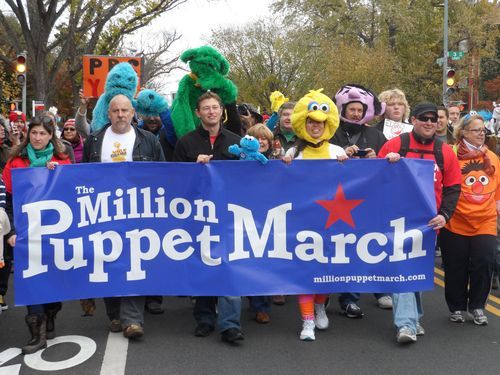

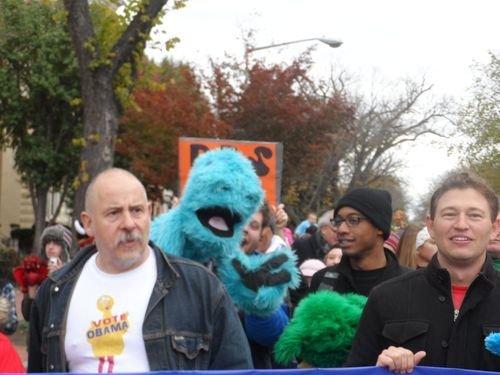
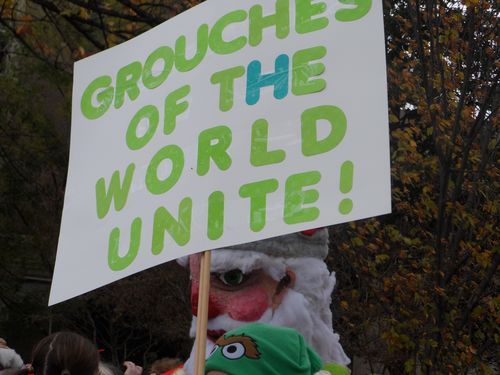




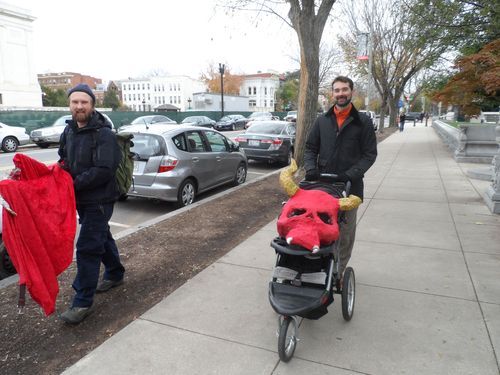


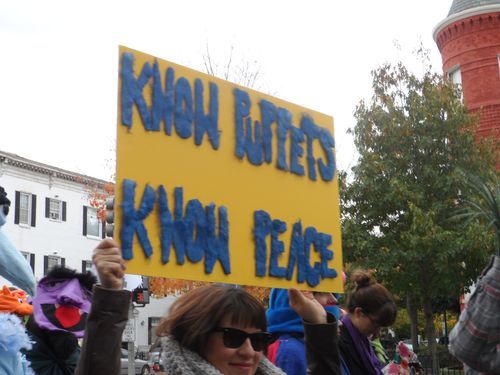



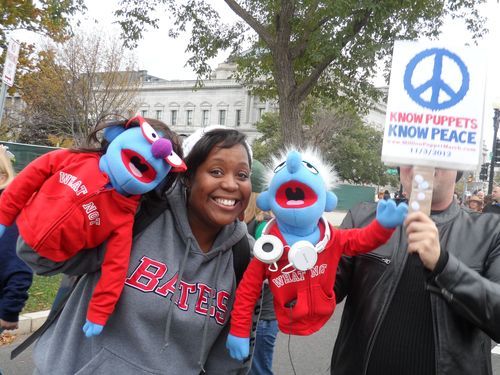

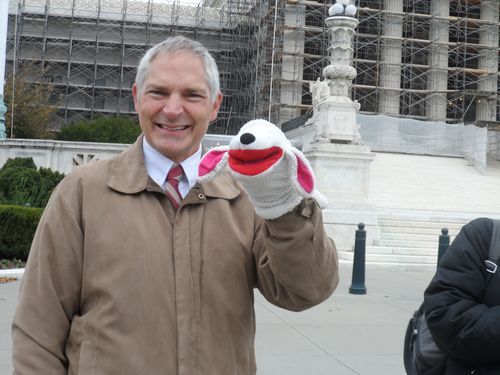
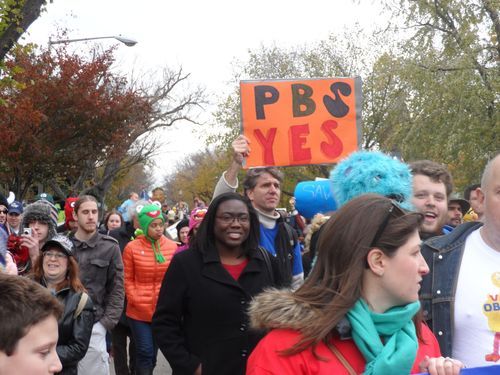
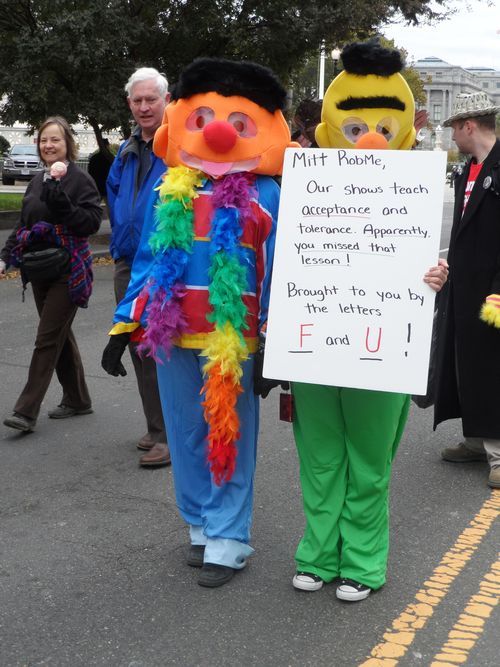

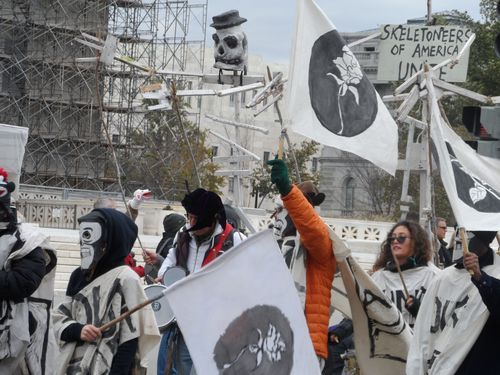
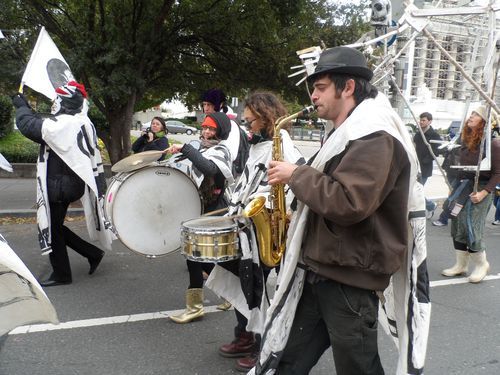



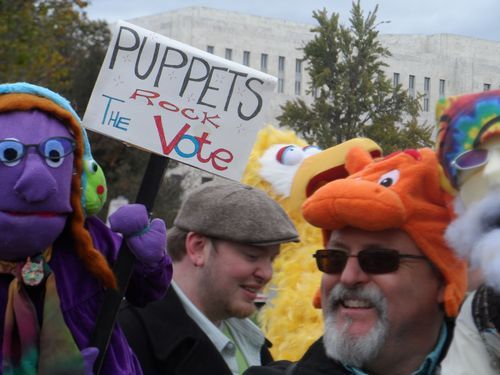





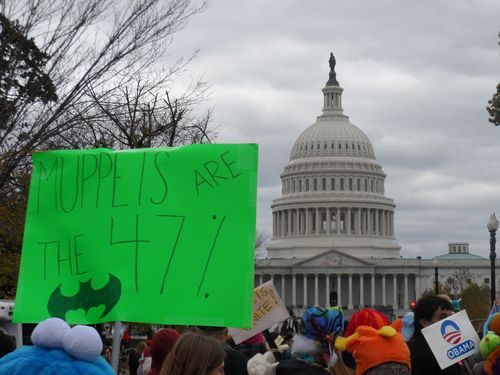
0 notes
Video
youtube
Real Ohioans explain why they’re voting for Romney, and against Obama.
1K notes
·
View notes
Quote
AlterNet Main Site Temporarily Down Due to Hurricane
You have been redirected to AlterNet's Tumblr site because our server was injured in the flooding that inundated New York City's underground infrastructure and electrical grid. Please bear with us as we continue to post our original journalism and analysis -- along with the best of the progressive Web -- here until the main site is up and running.
Stick with us, loyal readers! Less than a week before the election, we'll be providing you with critical information, just as we always do.
1 note
·
View note
Text
The Power Outage Didn't Divide NYC: Income Inequality Did
The line wasn't between those with electricity and those without, but between those who had recourse and those who didn't.
By Sarah Seltzer | AlterNet
After an explosion at a power station cut off service to Lower Manhattan, photos showed a stark divide in Manhattan between lit-up uptown and downtown blanketed in darkness. The image was gripping and the frightening experience of many downtown is no joke--nor are the losses of life from the storm.
Still, when the inevitable posts went up declaring that "New York is now divided," I had to laugh. Because it's not the divisions we can see after a storm, but rather the city's giant unseen fissure which makes events like Sandy so threatening.
Witness this piece from Gothamist, in which a citizen sleuth checked out what was happening in parts of Downtown where the poorest residents live and wrote in with his findings:
There is no running water or flushing toilets for people living in the Jacob Riis Houses and surrounding NYCHA buildings on the Lower East Side. In my estimate, this is roughly 20,000 people. One family I spoke with is packing their bags and moving to Brooklyn until services are restored. But it did not appear that all residents were evacuating, even as their toilets did not flush.
Compare it to Max Abelson's gem of a piece about Wall Street's coping mechanisms:
JPMorgan, which sent out more than a dozen hurricane updates to its employees featuring detailed weather maps, kept parts of its 270 Park Ave. cafeteria open yesterday. Danishes and scones were available near the salad bar, and the bank’s deli had sandwiches with grilled vegetables. The dumpling bar was closed.
The dumpling bar was closed! Alas. It's positively Dickensian, isn't it?
This tale of two cities within one city's borders is explained further in a widely-circulated story by David Rohde of Reuters summing up the gaping divide:
Those with a car could flee. Those with wealth could move into a hotel. Those with steady jobs could decline to come into work. But the city's cooks, doormen, maintenance men, taxi drivers and maids left their loved ones at home.
New census data shows that the city is the most economically divided it has been in a decade, according to the New York Times. As has occurred across the country, the rich are getting richer and the poor are getting poorer. Twenty-one percent of the city is in poverty, and the median household income decreased by $821 annually. Per the Times: "Median income for the lowest fifth was $8,844, down $463 from 2010. For the highest, it was $223,285, up $1,919."
Manhattan, the city's wealthiest and most gentrified borough, is an extreme example. Inequality here rivals parts of sub-Saharan Africa. Last year the wealthiest 20 percent of Manhattan residents made $391,022 a year on average, according to census data. The poorest 20 percent made $9,681.
I've been on the lucky side of the New York divide my whole life, but as a die-hard city native passionate about injustice, I've seen firsthand evidence of both the steady persistence of this localized income gap and also its widening. Rents, private school tuition and luxury high-rises climb ever upwards, while public schools and public facilities languish and poorer neighborhoods remain decimated by the mortgage crisis precipitated by neighbors in the Financial District. People with disabilities and health problems are particularly vulnerable during times like Sandy--and always.
Anyone who grew up in the city and is paying attention can tell you that the problem of stratification--which helped give birth to Occupy and has been enabled by Mayor Bloomberg--is indeed worse than ever.
And as Think Progress reminds us and the evidence from Sandy shows, income inequality makes storms more dangerous.
11 notes
·
View notes
Text
Todd "Legitimate Rape" Akin Sought to Narrow Child-Abuse Definition
Many seem to think that Todd Akin’s “legitimate rape” remarks placed him on the fringe of the Republican Party. In reality, he’s spent most of his career there.
By Josh Glasstetter | Right Wing Watch
It’s now widely known that Akin teamed up with Paul Ryan in 2011 to try to narrow the definition of rape – i.e., “forcible rape.” This is no anomaly. Early in his career as a state legislator, Akin even tried to narrow the definition of child abuse.
Back in May of 1991, the Missouri House debated a bill to “outlaw rape and sexual abuse in marriage.” “Rape is rape,” said Rep. Jo Ann Karll shortly before the bill was overwhelmingly passed. “Missouri is finally moving into the 20th century,” said Colleen Coble, executive director of the Missouri Coalition Against Domestic Violence.
But not everyone was celebrating. The St. Louis Post-Dispatch reported on 5/1/91 that Akin voted for the bill but “questioned whether a marital rape law might be misused ‘in a real messy divorce as a tool and a legal weapon to beat up on the husband.’”
Just about any law can be abused, and lawmakers must always be cognizant of this. But Akin seems to be preoccupied with the potential for abuse of the law whenever it relates to the government preventing abuse in the household.
Akin and his supporters believe that the husband is head of the household, and they’re loathe to regulate what he can and cannot do to his wife and children. In fact, prominent Akin supporter Phyllis Schlafly denies the very possibility of marital rape: “By getting married, the woman has consented to sex, and I don't think you can call it rape.”
And so in March of 1992, Akin fought for a narrower definition of child abuse. The Missouri House was considering a bill to create a “statewide child abuse review board” and tighten the standard for proving child abuse from “reason to suspect” to “credible evidence.”
The bill’s sponsor said the definition change was necessary to ensure that “all cases of child abuse can be covered.” Akin, however, was suspicious. He argued that the bill “needed a more restrictive definition of abuse” because of the potential for abuse of the child abuse law. The Post-Dispatch reported on 3/5/92:
Akin said he was concerned that ‘the department could come into your home and if your kid had just fallen off his bike and skinned his knee…take your kid away.’ Akin also said that with a loose definition of abuse, neighbors might use child-abuse reports ‘as a tool to harass, a way to get even with’ someone they dislike.
This is how Akin’s mind works. You need to worry about vengeful soon-to-be ex-wives claiming rape to get back at their husbands. You need to make sure that non-forcibly raped women aren’t getting government-funded medical care. And you can’t let neighbors harass one another by falsely claiming child abuse to the overbearing nanny state enforcers who will take kids away for having a scraped knee.
Akin’s efforts earned him a rebuke from the Post-Dispatch editorial board, which singled him as an alarmist who supports an “excessively restrictive child-mistreatment law” and resorts to “extreme and unlikely examples to bolster his case.” It seems like they had him pegged way back then.
Here is the full 3/10/92 editorial, entitled “Abuse Law Fair to the Accused, Children”:
The Missouri House is moving ahead in setting up a state board that would arbitrate disputes between people accused of child abuse and the Division of Family Services. The House gave initial approval to this proposal on Wednesday. It shouldn't allow critics to prevent it from passing the bill, sponsored by Rep. Kaye Steinmetz of Florissant.
Missouri's child-abuse law is basically a good one, but it needed to be revised. The bill would restrict the standard the state would use in proving child abuse. The old standard called for ‘reason to suspect.’ The new standard would require ‘credible evidence.’
Clearly, the change is aimed at protecting people from being recklessly and falsely accused of abusing children. Some critics say the definition should be even more restrictive, but they should give this proposal the benefit of the doubt. Nevertheless, more restrictions will be added to the law if critics, like Republican Rep. Todd Akin of St. Charles, get their way. Mr. Akin resorts to extreme and unlikely examples to bolster his case.
The bill, he argues, would permit child-abuse investigators to ‘come into your home and if your kid had just fallen off his bike and skinned his knee…take your kid away.’ In fact, the more restrictive the law, the more it ties the hands of child-abuse investigators and the more likely serious cases of child mistreatment might go undetected.
Mr. Akin does raise a real concern, however, when he says a disgruntled person might try to use the child-abuse law to harass a neighbor. But the way to address that issue is through better trained child-abuse investigators. The bill would mandate improved training, which should make the workers more proficient in investigating cases while protecting people from being falsely accused.
The statewide child abuse review board would be appointed by the governor and would require Senate confirmation. The Legislature should see the benefits in passing the bill in its existing form rather than weakening it to appease alarmists who favor an excessively restrictive child-mistreatment law.
1 note
·
View note
Text
Global Warming Systemically Caused Hurricane Sandy
Global warming is real, and it is here. It is causing -- yes, causing -- death, destruction, and vast economic loss.
By George Lakoff | AlterNet
Yes, global warming systemically caused Hurricane Sandy -- and the Midwest droughts and the fires in Colorado and Texas, as well as other extreme weather disasters around the world. Let's say it out loud, it was causation, systemic causation.
Systemic causation is familiar. Smoking is a systemic cause of lung cancer. HIV is a systemic cause of AIDS. Working in coal mines is a systemic cause of black lung disease. Driving while drunk is a systemic cause of auto accidents. Sex without contraception is a systemic cause of unwanted pregnancies.
There is a difference between systemic and direct causation. Punching someone in the nose is direct causation. Throwing a rock through a window is direct causation. Picking up a glass of water and taking a drink is direct causation. Slicing bread is direct causation. Stealing your wallet is direct causation. Any application of force to something or someone that always produces an immediate change to that thing or person is direct causation. When causation is direct, the word cause is unproblematic.
Systemic causation, because it is less obvious, is more important to understand. A systemic cause may be one of a number of multiple causes. It may require some special conditions. It may be indirect, working through a network of more direct causes. It may be probabilistic, occurring with a significantly high probability. It may require a feedback mechanism. In general, causation in ecosystems, biological systems, economic systems, and social systems tends not to be direct, but is no less causal. And because it is not direct causation, it requires all the greater attention if it is to be understood and its negative effects controlled.
Above all, it requires a name: systemic causation.
Global warming systemically caused the huge and ferocious Hurricane Sandy. And consequently, it systemically caused all the loss of life, material damage, and economic loss of Hurricane Sandy. Global warming heated the water of the Gulf and Mexico and the Atlantic Ocean, resulting in greatly increased energy and water vapor in the air above the water. When that happens, extremely energetic and wet storms occur more frequently and ferociously. These systemic effects of global warming came together to produce the ferocity and magnitude of Hurricane Sandy.
The precise details of Hurricane Sandy cannot be predicted in advance, any more than when, or whether, a smoker develops lung cancer, or sex without contraception yields an unwanted pregnancy, or a drunk driver has an accident. But systemic causation is nonetheless causal.
Semantics matters. Because the word cause is commonly taken to mean direct cause, climate scientists, trying to be precise, have too often shied away from attributing causation of a particular hurricane, drought, or fire to global warming. Lacking a concept and language for systemic causation, climate scientists have made the dreadful communicative mistake of retreating to weasel words. Consider this quote from "Perception of climate change," by James Hansen, Makiko Sato, and Reto Ruedy, Published in the Proceedings of the National Academy of Sciences:
...we can state, with a high degree of confidence, that extreme anomalies such as those in Texas and Oklahoma in 2011 and Moscow in 2010 were a consequence of global warming because their likelihood in the absence of global warming was exceedingly small.
The crucial words here are high degree of confidence, anomalies, consequence, likelihood, absence, and exceedingly small. Scientific weasel words! The power of the bald truth, namely causation, is lost.
This no small matter because the fate of the earth is at stake. The science is excellent. The scientists' ability to communicate is lacking. Without the words, the idea cannot even be expressed. And without an understanding of systemic causation, we cannot understand what is hitting us.
Global warming is real, and it is here. It is causing -- yes, causing -- death, destruction, and vast economic loss. And the causal effects are getting greater with time. We cannot merely adapt to it. The costs are incalculable. What we are facing is huge. Each day, the amount of extra energy accumulating via the heating of the earth is the equivalent of 400,000 Hiroshima atomic bombs. Each day!
Because the earth itself is so huge, this energy is distributed over the earth in a way that is not immediately perceptible by our bodies -- only a fraction of a degree each day. But the accumulation of total heat energy over the earth is increasing at an astronomical rate, even though the temperature numbers look small locally -- 0.8 degrees Celsius so far. If we hit 2.0 degrees Celsius, as we may before long, the earth -- and the living things on it -- will not recover. Because of ice melt, the level of the oceans will rise 45 feet, while huge storms, fires, and droughts get worse each year.
The international consensus is that by 2.0 degrees Celsius, all civilization would be threatened if not destroyed.
What would it take to reach a 2.0 degrees Celsius increase over the whole earth? Much less than you might think. Consider the amount of oil already drilled and stored by Exxon Mobil alone. If that oil were burned, the temperature of the earth would pass 2.0 degree Celsius, and those horrific disasters would come to pass.
The value of Exxon Mobil -- its stock price -- resides in its major asset, its stored oil. Because the weather disasters arising from burning that oil would be so great that we would have to stop burning. That's just Exxon Mobil's oil. The oil stored by all the oil companies everywhere would, if burned, destroy civilization many times over.
Another way to comprehend this, as Bill McKibben has observed, is that most of the oil stored all over the earth is worthless. The value of oil company stock, if Wall St. were rational, would drop precipitously. Moreover, there is no point in drilling for more oil. Most of what we have already stored cannot be burned. More drilling is pointless.
Are Bill McKibben's and James Hansen's numbers right? We had better have the science community double-check the numbers, and fast.
Where do we start? With language. Add systemic causation to your vocabulary. Communicate the concept. Explain to others why global warming systemically caused the enormous energy and size of Hurricane Sandy, as well as the major droughts and fires. Email your media whenever you see reporting on extreme weather that doesn't ask scientists if it was systemically caused by global warming.
Next, enact fee and dividend, originally proposed by Peter Barnes at Sky Trust and introduced as Senate legislation as the KLEAR Act by Maria Cantwell and Susan Collins. More recently, legislation called fee and dividend has been proposed by James Hansen and introduced in the House by representatives John B, Larson and Bob Inglis.
Next. Do all we can to move to alternative energy worldwide as soon as possible.
5 notes
·
View notes
Text
Romney Ducks Reporters on Ending FEMA -- "You’ve been asked 14 times. Why are you refusing to answer the question?"
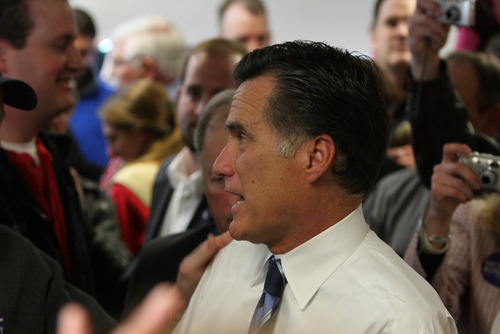
Photo credit: Evan Meyer / Shutterstock.com
Romney’s past platforms have indicated that the candidate would push to splinter and then privatize FEMA's work. Now, after a major disaster, he doesn't want to talk about it.
By Laura Gottesdiener | AlterNet
Presidential candidate Mitt Romney found himself in an awkward line of questioning yesterday when reporters wanted to know if he would really slash funding for FEMA, the federal government agency in charge of Hurricane Sandy relief efforts.
Rather than fall back on his tried-and-true model of flip-flopping his position to fit the latest poll (see Romney on abortion and health care), he opted for a bold new strategy: entirely ignore the question.
“Governor, you’ve been asked 14 times. Why are you refusing to answer the question?” one journalist complained at Romney’s press conference yesterday in Ohio.
But still, not a word from the man who just may (but probably not) find himself in the position to be making such decisions. Meanwhile, his aides scrambled to assure the journalists that he wouldn’t kill the disaster relief agency, although their boss’s silence spoke far louder than their words.
Romney’s past platforms have indicated that the candidate would, in fact, push to splinter and then privatize the agency, which is designed to provide rapid, federal assistance in crisis situations, particularly after during and after natural disasters.
“Every time you have an occasion to take something from the federal government and send it back to the states, that’s the right direction,” Romney said during a CNN debate in June 2011.
“And if you can go even further and send it back to the private sector, that’s even better.”
On Tuesday, Romney and his camp once again hit the campaign trail, attempting to cover up the obvious publicity stunts by pretending the press conferences were part of Romney’s push to collect donations. As the Washington Post notes, the campaign’s push to collect donations actually goes against the advice of disaster relief professionals, who say that processing these donations becomes a logistical nightmare if the collectors aren’t prepared to put the donations to use themselves. (Romney hasn’t said anything about setting up actual aid stations.)
Then again, collecting donations does create a powerful photo op.
Whether or not to keep FEMA should be a major concern as scientists increasingly sound the alarms that extreme weather disasters--such as Hurricane Sandy--will become increasingly frequent as climate change accelerates. Then again, since Romney has said that he doesn’t believe climate change is caused by human activity, perhaps it makes sense that he doesn’t think that federally coordinated, human response teams are necessary either.
6 notes
·
View notes
Text
Jill Stein Arrested for Delivering Food and Supplies to Climate Activists Opposing Texas Keystone XL Pipeline

For the second time in a month, the Green Party presidential candidate finds herself in handcuffs.
By AlterNet Staff
Here's a press release from the Green Party candidate, who has never been arrested until she launched her campaign, but has now been put into handcuffs twice in the last month.
In the wake of Hurricane Sandy, Green Party presidential candidate Jill Stein was handcuffed and arrested this morning after bringing food and supplies to a coalition of climate justice activists, known as the "Tar Sands Blockade," who are attempting to stop the Keystone XL pipeline in Texas. She is currently at Wood County Jail awaiting processing.
"Everyone needs to step up resistance to climate-killing emissions," said Stein, who was willing to risk arrest in order to show solidarity for this blockade. "Romney and Obama are only talking about the symptoms of climate change in terms of destruction caused by Hurricane Sandy; the blockaders are addressing the cause."
Jill Stein was joined by seven others, including three blockaders and four members of the press. They were delivering fresh fruits and vegetables, canned proteins, trail mix, and Halloween candy. They were not warned of imminent arrests; and the arresting officers did not self-identify as police.
6 notes
·
View notes
Text
Major Retailer Urges Workers To Take 'Civics Course' With Anti-Obama Content
AlterNet uncovers an anti-Obama program linked to the Koch brothers' Americans for Prosperity, spoon-fed to employees of a major home-improvement chain.
by Adele M. Stan | AlterNet
Koch-Linked Program
In our June 2011 exposé, we reported that Herman Cain and Wall Street Journal editorial board member Stephen Moore conducted more than a dozen Prosperity 101 seminars for the employees of companies in Wisconsin and other Midwestern states during the campaign season for the 2010 congressional midterm elections. Hansen, we reported, was looking to create an online Prosperity 101 program for the Wisconsin-based Menards, and it appears as if something like that happened just in time for the 2012 presidential campaign season.
While it remains unclear whether the current Menards program was sold to the retailer by Prosperity 101, what is clear is that several sections of the program come directly -- sometimes with minor edits -- from the textbook, also called Prosperity 101, that was distributed during a breakout session that took place at an Americans for Prosperity Foundation conference in Las Vegas in July 2010. The conference, called RightOnline, took place at the opulent Venetian, owned by right-wing super-PAC funder Sheldon Adelson, and billed by AFPF president Tim Phillips as "the only non-union hotel on the [Las Vegas] Strip."
The Americans for Prosperity Foundation is chaired by David Koch, the multi-billionaire funder, with his brother, Charles, of numerous right-wing think tanks and interest groups, and co-owner of Koch Industries, the second-largest privately held corporation in the U.S. Block is the former state director for the Wisconsin chapter of Americans for Prosperity, the foundation's sibling organization, and was deeply involved in effecting the sharp turn to the right that took place in Wisconsin politics in 2010 with the election of Governor Scott Walker, Sen. Ron Johnson, and Tea Party-allied members of Congress and the state legislature. (During the course of that campaign, Block was implicated in a vote-caging scheme apparently designed to suppress turnout of young people and African Americans at Milwaukee polling places. He also enjoyed a brief moment of fame as the "smoking man" in a bizarre Herman Cain campaign ad.)
Menards, as we reported last year, is notorious not just as a polluter, but as a virulently anti-labor company. One former manager told Milwaukee magazine reporter Mary van de Kamp Nohl that he wasn't allowed to hire two job candidates because, while in high school, they had worked as baggers in a union-organized grocery store. Menards threatened store managers with a 60 percent pay-cut, according to a 2003 Forbes article, if a union managed to get a foothold in a Menards store on that manager's watch.
So it was not surprising to learn that Menards' voluntary at-home civics course is part of a broader training program in which employees are encouraged to take part, unpaid, on their own time, often to simply learn about products sold in various store departments. After completing any of these courses with a passing grade, the employee is given a certificate, and sometimes a prize, such as an item of apparel bearing the Menards logo.
Attack on Obama
Among the materials the Prosperity 101 book and the Menards employee civics course both share is an article by Herman Cain, and another by Stephen Moore and Tyler Grimm (but in the Menards course, the article includes some Menards-specific references and a jokey graphic mock-up of an IRS tax-filing form that demands the filer pay his or her entire income to the government). More troubling, though, is an unsigned article not included in Prosperity 101 that is based on a study by the Heritage Foundation. The article, titled "A Path to Prosperity," characterizes Obama's 2012 budget as a "job destroying," "reckless spending spree," while laying out, in positive terms, an economic agenda almost identical to that of Republican presidential candidate Mitt Romney. (See graphic, below.)
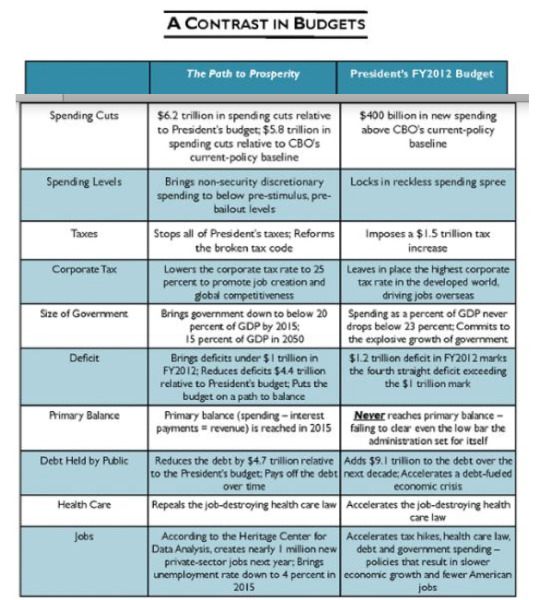
In an article titled "The Keys to Prosperity" that also appeared in a slightly different form in the Prosperity 101 textbook, Stephen Moore offers, as I reported in 2011:
…a series of charts, some of them indecipherable, including a pie chart called "Where Your Federal Tax Dollar Goes." (Apparently derived from an earlier presentation Moore made at an AFP Foundation event, the same charts can be found here; scroll to slide no. 15/16 for this one.) Citing such official sources as the Internal Revenue Service, the Government Accountability Office, and the Bureau of Labor Statistics, it features eight slices labeled "Flushed Down a Toilet, "Pissed Away," "Down a Rat Hole," "Sleaze," "Corruption," "Given to 'Supporters,'" "Tossed Down the Drain," and "Postage Stamps." (The latter, Moore baselessly contends, accounts for 6 percent of your tax dollars -- which is, incidentally, six times the allotment for non-military foreign aid.)

Graphic from Steven Moore's article, "The Keys to Prosperity," as presented in Menards training program for employees, "Civics 101: The National Self Governing Will In-Home Training, Course 3: American Job Security."
The article's primary point is Moore's claim that the rich are already paying more than their fair share of taxes, and that to ask them to pay more would have a detrimental effect on the economy.
Jacksonian Resentment
A second piece bearing Moore's byline in the Menards course, "A Nation of Takers, Not Makers," argues that the public sector is too large, and that government employees are draining the economy. The piece opens with this misleading statement:
If you want to understand better why so many states—from New York to Wisconsin to California—are teetering on the brink of bankruptcy, consider this depressing statistic: Today in America there are nearly twice as many people working for the government (22.5 million) than in all of manufacturing (11.5 million). This is an almost exact reversal of the situation in 1960, when there were 15 million workers in manufacturing and 8.7 million collecting a paycheck from the government.
If you're a person stuck in a low-paying, non-union retail job, that sounds pretty awful. But Moore neglects to mention that the percentage of the workforce made up of government workers is almost exactly the same today as it was in 1960: 15.2 percent in 1960, and 15.3 percent in 2010. What's changed is the size of the manufacturing sector due to the offshoring of manufacturing jobs -- something Moore and his paymasters at Rupert Murdoch's News Corporation (which owns the Wall Street Journal) and the Americans for Prosperity Foundation (from which he's collected hundreds of thousands of dollars in speaking fees) are all in favor of.
The very title of the "Takers, Not Makers" piece invokes the old right-wing "producerist" trope, described this way by Chip Berlet and Matthew N. Lyons in their book, Right-Wing Populism in America:
Calls to rally the virtuous "producing classes" against evil "parasites" at both the top and bottom of society is a tendency called producerism. It is a conspiracist narrative used by repressive right-wing populism. Today we see examples of it in the Tea Party and Republican Party rhetoric, some sectors of the Christian Right, in the Patriot movements and armed militias, and in the White Supremacist Right.
Berlet and Lyons go on to explain producerism's origins during the presidency of Andrew Jackson, during which a "vision of the producing classes included white farmers, laborers, artisans, slave-owning planters, and 'productive' entrepreneurs…"
In the Menards civics course, which also addresses the nation's early history, Andrew Jackson is given an outsized role -- four pages unto himself, more word spillage than devoted to any one of the nation's founders, for instance. What makes Jackson such a hero to Menards? He paid off the national debt in full before leaving office. (The method by which he did this had nothing to do, the reader is assured, with the ensuing Depression.)
Fear-Mongering on Regulation and Environmental Protection
Other articles in the Menards civics course focus on the evils of cap-and-trade pollution-curbing schemes which, the reader is told, "have resulted in the pilfering of nearly $1 trillion from the private sector." The Waxman-Markey bill, supported by the Obama administration and which aimed to apply a cap-and-trade framework to reduce carbon emissions, is described as a threat to job security, and would, according to Menards, "destroy between 1.8 million and 2.4 million jobs."
Cap-and-trade is also a favorite bugaboo of Americans for Prosperity, and coincidentally an idea fiercely opposed by Koch Industries, whose core business is in the gas, oil and coal sectors.
Also targeted for the ire of Menards management is the auto bailout, and the TARP measures that bailed out the big banks. Meanwhile, government programs aimed at helping smaller businesses are described as a government plan for making small businesses dependent on government.
Familiar Rhetoric
If this rhetoric sounds familiar, it's because these are the same lines that have been advanced by Koch-founded Americans for Prosperity, and the Tea Party movement that AFP shaped and nurtured. In fact, the opening volume of the course is a rather benignly told history of the nation's founding that is imbued with graphics recognizable to any Tea Party-leaning individual, thanks to the movement's co-option of some of the American Revolution's most iconic symbols, most notably the "Join or Die" cartoon published by Benjamin Franklin showing a snake cut into segments labeled for eight territories or colonies. The cartoon was appropriated by Glenn Beck for his 9/12 Project, which was a Tea Party organizing effort conducted over the cable spectrum occupied by Fox News Channel, which is also owned by Rupert Murdoch's News Corp.
When the Prosperity 101 program from which the Menards civics course is derived first launched, Linda Hansen promoted it with an endorsement from Menards' owner, J.R. Menard, who is quoted on her textbook's back cover:
"It is the duty as a responsible employer to inform employees of the current and future business climate so they may make the best decisions for their career and their families. Public policy that is not business friendly will be detrimental to job quality and growth unless we voice our concerns and make a difference."
On the inside cover, Hansen is described as the creator of Prosperity 101, and executive director of the Wisconsin Prosperity Network, one of the two non-profits founded by Mark Block that have earned the scrutiny of the feds. The other is a now-defunct entity called Prosperity USA, whose last profit-and-loss statement, as reported by Daniel Bice, revealed up to $42,000 in payments to Hansen's for-profit Prosperity 101, for which she is named as the registered agent. Prosperity USA was also revealed to have improperly covered expenses for the Herman Cain campaign. including the chartering of a private jet to ferry the former Godfather's Pizza CEO to campaign events.
When he shilled for the Prosperity 101 program at Sheldon Adelson's hotel in Las Vegas in 2010, Cain called it the right's "answer to ACORN" -- referring to the now-defunct community organizing group that was famous for registering voters, especially among the poor and communities of color.
In his article in the Menards course, Herman Cain reinforces the notion that workers' jobs are threatened by those who seek to regulate business. He writes:
There are three things you can do to protect your personal prosperity. First, you can become informed about threats to your prosperity. Secondly, be involved. Register to vote and make sure you vote in elections. You can be involved by being connected to an organization that reflects your values and helps to express your view. Last but not least, be impactful. Voting makes an impact, but also be ready to protect your right to prosperity with your voice. Your voice and your votes are the two major weapons you can use to make sure we get this nation back on track.
At Menards, the boss may step just shy of telling you who to vote for, but there's little doubt for whom he thinks you should cast your vote. Hoping for a promotion? You just may want to rethink that Obama/Biden bumper sticker.
-------------------
Adele M. Stan is AlterNet's Washington correspondent. Follow her on Twitter: www.twitter.com/addiestan. Send tips to: [email protected]
#Menards#David Koch#Charles Koch#Mark Block#Linda Hansen#anti-Obama#Romney#Prosperity 101#Americans for Prosperity
31 notes
·
View notes
Video
youtube
What Top Republicans say about Mitt Romney (by tlbuck20)
1 note
·
View note
Photo
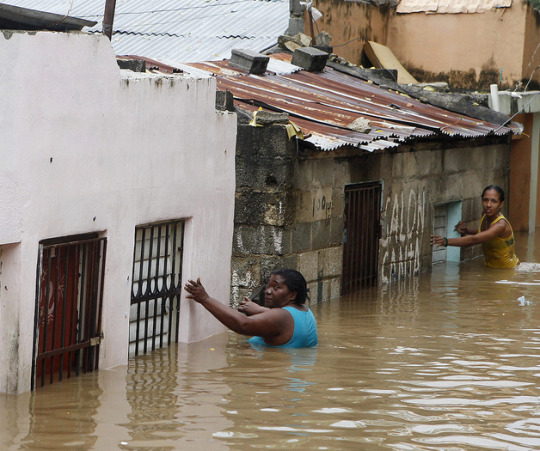
THE ‘OTHER SIDE’ OF SANDY NOT SEEN ON TV OR IN NEWSPAPERS. Sandy also struck CUBA, HAITI AND THE DOMINICAN REPUBLIC Images that you will not see in the newspapers or on TV. There are now many more homeless people in Cuba, Haiti and the Dominican Republic suffering from the ravages of hurricane Sandy passing through their respective nations, prior to the hurricane also pummeling the east coast of the United States. In solidarity with all people, in light of the loss of their homes and loved ones, we must also speak out for them. Pain and suffering does not care about borders and true compassion has no flag to wave. Our hearts are with all who are impacted by this international tragedy. Please become more informed and support the efforts of groups attempting to help lives everywhere, who know no borders. Image of Orlando Barria (EFE) in the La Barquita, Santo Domingo, Dominican Republic, October 26, 2012 (A.E.L.L.A.)
32K notes
·
View notes
Conversation
Romney: IF I AM ELECTED I AM GOING TO IMPERIALISM HERE AND HERE AND HERE
Obama: WELL I'VE ALREADY IMPERIALISM'D HERE AND HERE AND HERE
2K notes
·
View notes
Quote
And so as New York's financial district was choked with glitter, balloons, dance parties and a whole lot of police, Occupy's anniversary feels less like a celebration of what was and more a demonstration of what's becoming.
Occupy Infiltrates Financial District with Creative, Decentralized Actions for First Anniversary | Alternet
4 notes
·
View notes
Text
Bowhunter?
Secret Service to Call Ryan "Bowhunter": Nine Better Nicknames They Could Have Used | Alternet
1. Noodler. Apparently this is the kind of bare-handed fishing Ryan likes to do. It has a certain limp resonance. Wonder why they chose bow-hunter instead?
2. Ladykiller. This works well as a double-entendre because of his boyish good looks BUT ALSO because he supported the Let Women Die Act. Get it? Hahaha.
3. Brown-noser. Kissing up to the Right Wing establishment since his first steps into public service (suggested by AlterNet's own Joshua Holland).
4. Rand-flipper. Does he worship Ayn Rand or not? Make up your mind, Paul Ryan.
5. Lyin' Ryan. It's already a hashtag. "Pinocchio" would work nicely, too, in this category.
6. Budget-bomber. Remember when report surfaced saying that Ryan scuttled a "Grand Bargain" budget deal because he was afraid it might work--and then blamed its collapse on Obama?
7. Stimulus-begger. Ryan penned an eloquent pea for stimulus funds for his district AT THE VERY SAME TIME he was denouncing the stimulus as being all about the bureaucratic central planner's crushing noble individualists to the ground. Hypocrite would work nicely, too, in this category.
8. Slowpoke. Okay, I admit that workout-obsessed Paul Ryan would kick my blogging butt in an old-fashioned footrace, but why did he lie about his marathon time again? Maybe he's a compulsive fibber. Which brings us to...
9. Compulsive fibber. Not catchy, possibly depends too much on armchair psychoanalysis, but nicely self-explanatory all the same.
4 notes
·
View notes
Photo

“I watched most of the major speeches and it was something that reminded me of another period in our history. [The RNC’s speeches] didn’t recognize the distance we have come and the progress we have made; except for Secretary Rice, there was very little said about social justice, poverty and the hunger that still exists in America and around the world. The convention failed to recognize what I consider basic human rights, not just the issue of civil rights, but human rights: the rights of women, the gay community, seniors. Very little was said about protecting the environment.”
- John Lewis in “Dispatches from the Democratic National Convention” by Kelly Candaele. In this first installment to the special LARB series, Kelly Candaele interviews Congressman John Lewis, the U.S. Representative for Georgia’s 5th Congressional district. Read the full interview at LARB.
31 notes
·
View notes
Video
youtube
Some 800 people gathered in Charlotte’s Frazier Park and marched to Uptown, where the Democratic National Convention kicks off on Tuesday. Environmental justice, immigration, labor, education, anti-war, and Occupy activists spent nearly four hours in the streets despite an overwhelming amount of police and other security forces.
The march marked the first major protest for Undocubus riders. The bus made its way from Phoenix, Arizona, picking up riders along the way from various states in the South in the past month. The activists are calling for the immigration reform that President Obama promised when he first ran for office. Watch the full video to learn more about Undocubus and visit NoPapersNoFear.org to get involved.
25 notes
·
View notes